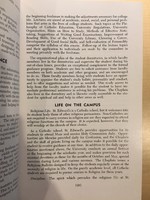Catholic Higher Education Before the Second Vatican Council
The Catholic Church exercised a keen interest in higher education before 1962 and the reforms of the Second Vatican Council, using education primarily as an avenue to promote a standard set of morals and mold proper Christians. In an encyclical letter published in December of 1929, Pope Pius XI expressed the idea of the "parental role" of the Catholic Church in Christian education, granted by the divine right given to teach and present a true set of morals [1]. To this effect, education functioned as an tool to create ideal Catholics who shared the same beliefs and values as prescribed by the Church.

The Holy Cross Order swells in ranks.

Texas Catholic educators meet to discuss future of higher education
Education on the campus of St. Edward's in 1960 before Vatican II reforms was organized into three objective phases according to the St. Edward's General Bulletin: the religious moral field, the academic and professional field, and the extra-curricular field. The objective of paramount concern to St. Edward's, and Catholic higher education in general, was the religious moral field [2]. Catholic institutions aimed to educate good Catholics and instill proper Catholic morals, often placing academic achievement as a secondary goal. Catholic students in the 1960s were expected and required to take formal classes on religion and philosophy; while in attendance at St. Edward's, former student and current faculty member Brother Richard Daly was made to complete 12 hours of theology and 12 hours of philosophy to earn an English degree [3]. The religious courses offered at St. Edward's from 1958-1960 included courses such as Introduction to Sacred Scripture, The Christian Virtues, Catholic Doctrine, and Catholic Apologetics, a class meant to teach how to defend and prove the Catholic faith against “modern errors” such as secularism and materialism [4]. Most of these classes were taught by Catholic priests and other religious personnel; in fact, the brothers of Holy Cross Congregation managed almost every aspect of the administration and campus maintenance [5].
Catholicism pervaded all aspects of campus life. Students were expected to attend mass and religious services held in the many chapels in the dormitories and around the school grounds. Non Catholic students were exempt from these course and activity requirements, but were expected to attend their own personal religious services, emphasizing the importance of religious practices on the whole [6]. The beneficial influence of practicing faith was advocated for as the best moral contribution Catholicism could make upon the world.
